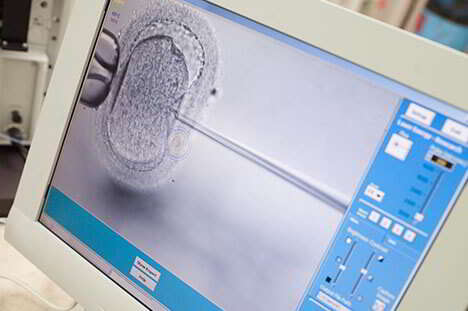

IVF stands for In Vitro Fertilisation. It is a method of assisted reproduction where a man’s sperm and a woman’s egg are combined in a laboratory dish, where fertilisation is expected to occur.
- In – In is simply the Latin for in. ‘In Vitro’ is a Latin term meaning ‘In Glass’.
- Vitro – As mentioned above, Vitro is the Latin word for Glass. This is a reference to the test tubes and beakers that were used in the early experiments that made IVF possible.
- Fertilisation – Fertilisation is simply the process where the sperm and the egg combine to create an embryo.
How Does IVF Work?
Every IVF treatment begins with a course of hormone therapy, which helps stimulate the development of several follicles in the patient’s ovaries. The follicles are then collected as eggs, which are transferred to a test tube to be fertilised to create several embryos.
The embryos remain in an incubator for between 2-5 days before being transferred through the vagina, into the uterus, where implantation occurs, and pregnancy begins. This process is made even easier thanks to IVI’s use of the embryoscope, which allows the embryologist to take images of each embryo using time-lapse imaging. The embryologist can then see how the embryo has developed within the incubator during the 3-5-day period. This method is far less invasive than egg extraction, where the woman is stimulated with injected medications to help develop multiple follicles and eggs.
Though, similar to natural conception, not all embryo implants automatically guarantee pregnancy. Embryos that are not immediately used are frozen so that if the first embryos are unsuccessful, the previously frozen embryos will be used in a second attempt for the woman to become pregnant. For an in-depth look at the process of IVF, our article: Our IVF Process in 7 Simple Steps
IVF Statistics in the UK
In the UK, over 60,000 fertility treatments are performed every year in licensed clinics. The success rate for IVF has risen exponentially since 1991, going from 14% to 26.5% in 2014, with the highest success figure reaching 32.5% for women under 32 years old.
Professor Adam Balen (chairman of the British Fertility Society) stated that “Over the years IVF success rates have improved and more people have access to treatment“, with Susan Seenan (chief executive of leading patient charity Infertility Network UK echoing this positive statement, saying that it is “heart-warming and reassuring to hear that a quarter of a million IVF babies have now been born in the UK.“
Infertility Statistics in the UK
Infertility is a problem that affects 1 in 7 couples in the UK, which is estimated to effect on average 3.5 million people within the UK. About 84% of couples who are trying to get pregnant (with unprotected sex) are successful within their first year. IVF has helped millions of men and women achieve their dreams through artificial insemination.
Similar procedures that aid fertility is ‘assisted reproductive technologies’. This term is given to techniques which can aid women in becoming pregnant. IVF falls into this category, alongside intracytoplasmic sperm injection (ICSI).
What is Infertility?
Infertility, in the simplest terms, is the inability for a couple to become pregnant (irrespective of cause). Infertility is often confused with secondary infertility – which is when a woman is unable to maintain a pregnancy until birth.
However, IVF now offers couples a good chance to not only become pregnant but have a child who is biologically related to them. In the U.S, over 1% of babies born are the result of reproductive technologies in conjunction with pregnancies.
We’re Here to Help
If you and your partner are considering undertaking the IVF process, our friendly and dedicated staff are here to guide you through any concerns and queries you may have.
As the world leader in fertility treatment, IVI will support you every step of the way in your IVF treatment and any other questions regarding fertility you may have. To book an appointment or attend one of our patient open evenings, please call 0800 52 00 161 or complete the patient contact form by clicking here.
If you’d like a more detailed insight into IVF, our article: What is IVF? Includes everything you need to know. We have also published an article detailing our simple Our 7 Step IVF Process if you’d like to know more about the IVF journey.
For any further information, please do not hesitate to contact us on 0800 52 00 161 or fill-out our contact form which can be found here.




Comments are closed here.